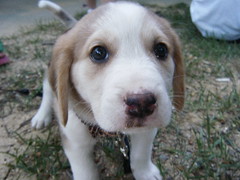 A small research study done in France indicates that a pet can help a child who has an autism spectrum disorder to develop his or her social skills. It appears that the timing of the pet’s arrival into the family needs to be when the child is younger, rather than older, for best results.
A small research study done in France indicates that a pet can help a child who has an autism spectrum disorder to develop his or her social skills. It appears that the timing of the pet’s arrival into the family needs to be when the child is younger, rather than older, for best results.
According to the Mayo Clinic, kids who have autism tend to have difficulties in three crucial areas of development. They struggle with social interaction, language, and behavior. One of the things that can help a child who has an autism spectrum disorder is called Applied Behavior Therapy, or ABA. Unfortunately, not all health insurance plans will cover the cost of this vital treatment.
There are other things that an also assist a child who has autism to improve his or her social skills. They aren’t a replacement for ABA, but they could provide some benefits. It turns out that one of those things is the family dog, cat, or other pet.
A study was done that was led by Marine Grandgeorge, from the Autism Resource Center at Hospital Bohars in France. The researchers looked at a group of children who had autism who were attending a day-care facility in France. The children ranged in age from 6 to 16.
Parents of the children in the study had previously completed an autism diagnostic test when the kids were around the ages of 4 or 5. Parents were asked to do the test once again for the purpose of this study. The parents were also given a questionnaire to fill out that asked about the family pets.
From this data, the researches were able to note the social behaviors of 12 children who had autism that came from families who got a pet after the child turned 5 years old. The researchers were able to compare it with the behaviors of 12 children who had autism who never owned a pet.
The results were interesting. Over time, the children who had a pet showed fewer deficits in their abilities to share food, or to share toys, with their parents or with other children than did the kids who never owned a pet. The kids who had pets became more able to offer comfort to parents or to children who were sad or hurt, than did the kids who had no pets. The type of pet, whether dog, cat, or hamster, didn’t matter. The gender of the child didn’t matter.
Image by _jennieMarie on Flickr

